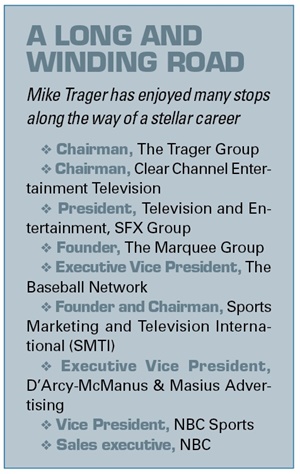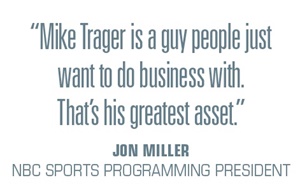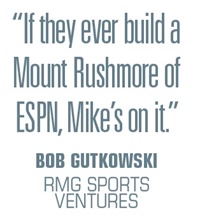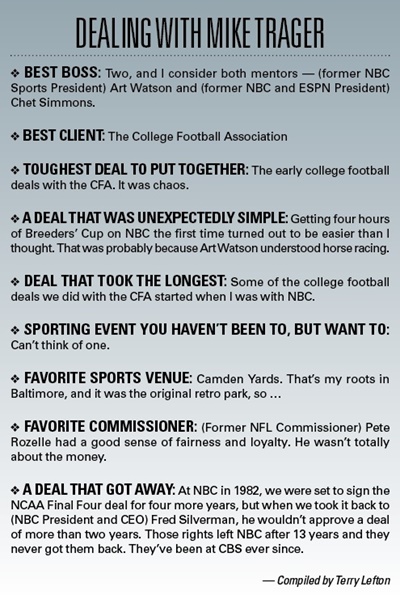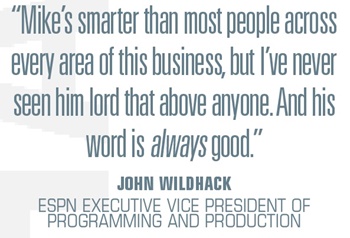Mike Trager felt the allure of television before his family even had one.
As a teen, before his family could afford a TV, Trager recalls spending Friday nights glued to the set. The only resident in Trager’s apartment complex who had one would turn his television to the window on Friday nights so neighbors could watch the fights. Boxers such as Kid Gavilan and Billy Graham would go at it on the “Gillette Cavalcade of Sports.”
 |
Photo by: PATRICK E. MCCARTHY
|
This is the first in a series of profiles of the 2015 class of The Champions: Pioneers & Innovators in Sports Business. This year’s honorees, and the issues in which they will be featured, are:
■ Feb. 16: Mike Trager
■ Feb. 23: David Falk
■ March 2: Donna de Varona
■ March 9: Len Elmore
■ March 16: Russ Granik
■ March 23: Tom Jernstedt
By the time Trager’s family could afford its own set, Trager would watch late-night staples like “Chiller Theatre” until his eyes were red and a test pattern filled the screen. The black-and-white tube was not much bigger than a toaster. The oversized TV cabinets of the day meant there was more wood than machinery.
Yet Trager was in love.
Fifty-five years later, the pull of sports television remains, and the change across the sports TV landscape reflects the transformation from those 1950s consoles to today’s oversized HDTVs. It’s an evolution that Trager helped orchestrate.
Working from virtually every side of the business, from sales and production to programming, marketing and sponsorship, and for sports as mainstream as football and baseball to such niche properties as
{podcast}
SBJ Podcast Archive:
Executive Editor Abraham Madkour and Champions editor Tom Stinson introduce and discuss the 2015 class of The Champions: Pioneers & Innovators in Sports Business.
horse racing and lacrosse, Trager’s reputation as a consummate deal-maker and programmer extends across the business of sports.
He’s also in an exclusive group: Someone whose influence reaches the entire industry, yet for whom nobody has an unkind word.
“Mike taught me that if you can make the guy sitting across from you successful, it will always come back in your favor,” said Jon Miller, NBC Sports programming president. “Mike Trager is a guy people just want to do business with. That’s his greatest asset.”

A veteran of five decades in the business, Trager’s accomplishments are many and remarkably diverse.
He was an architect of NBC Sports’ ascension in the mid-1970s, when ABC was the dominant force. When Anheuser-Busch tired of being bludgeoned by Miller and its early success with Miller Lite, Trager headed what became Busch Media in 1979, setting A-B on the road to becoming the predominant spender in American sports.
Once out on his own, in the 1980s, Trager helped launch sports TV staples such as the Breeders’ Cup and the distribution of college football across network television after the NCAA’s control was thrown out by the Supreme Court. He helped engineer a five-year Budweiser advertising exclusive with ESPN that legitimized the all-sports network in its infancy, and his involvement with the USFL included hiring sports TV pioneer Chet Simmons as commissioner.
When Major League Baseball was struggling without a network offer in 1993, Trager helped run The Baseball Network, an idea far ahead of its time.
Through it all, Trager maintained a reputation for intelligence, insight and the ability to cement deals others would have abandoned. He built accomplished organizations from scratch and demonstrated a complementary capability to manage up. He consistently built consensus among the millionaire owners and powerful property executives who control sports.
Everyone talks about Trager’s diverse capabilities and his diplomacy.
In the early ’80s, before the USFL had played a down, he got ABC and ESPN to pay a combined $13 million for the first year of the league’s TV rights. When ESPN trucks showed up to broadcast the league’s first night game in Birmingham, Ala., team owner Marvin Warner denied them access, claiming TV would kill ticket sales. Trager was the one who convinced Warner, a former U.S. ambassador to Switzerland, to unlock the stadium gates.
“He has this way of getting his opinions heard convincingly without stepping on toes,” said John Filippelli, YES Network president of production and programming, and a longtime colleague. “After 40 years in this business, I don’t know anyone that doesn’t have the highest regard for Mike Trager.
“This business being what it is, that statement alone is exceptional.”
Those who worked with Trager say he’s always had a broad view of the business, which explains his success in so many areas — sales, production, programming, marketing, sponsorship, even hospitality. He was building “multi-platform marketing deals” years before that jargon was coined.
“Mike always had a unique and intuitive sense for every element of this business,” said former NBC Sports President Ken Schanzer. “He was always a great advocate for his customers once they were sold — so they continued to buy from him.”
 |
Mike Trager has helped orchestrate much of sports television’s evolution over the last half century, working with many of the biggest networks and properties and negotiating landmark deals.
Photo by: PATRICK E. MCCARTHY
|
John Wildhack, ESPN executive vice president of programming and production, has known Trager for 25 years.
“Mike’s smarter than most people across every area of this business, but I’ve never seen him lord that above anyone,” Wildhack said. “And his word is always good.”
So many people in the business call Trager a mentor. Tom Worcester, who now heads music/brand partnerships at CAA, learned his negotiating style from Trager.
“He taught me to always look at the long play,” Worcester said. “Instead of squeezing the last few pennies out, settle for a fair and equitable deal that will lead to many more opportunities. Nothing beats the power of long-term relationships.”
NBC Sports’ Miller echoed those thoughts.
“I’ve known Mike 32 years, and I’ve never seen him lose his temper,” he said. “He’s tough, he’s smart, he understands the business, but he also always puts himself in the other guy’s shoes. There are so many people at leagues and properties that never think that way.”

Trager’s early sports memories include watching the Yankees play from the rooftop of his Bronx apartment building. They’d haul a radio up to keep track, because the rooftop view was obstructed. “You could only see to the right-field side of second base,” he recalled. “When a runner came around second, the crowd would tell you if he scored.”
Trager’s father had two college degrees, but also had the misfortune of entering the job market during the depression. So a man who wanted to be a teacher was instead a shoe salesman, working every Saturday and 70 hours or more per week, after night retail hours became more routine.
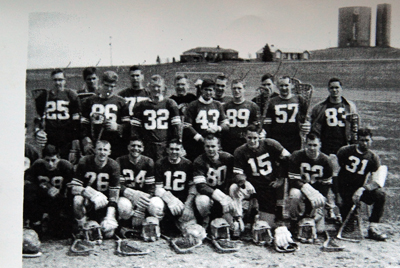 |
When Trager (No. 12) went to Bucknell in 1959, he petitioned the school to form a lacrosse club, and he was captain of its first team.
|
His father moved the family to Baltimore for a job with May Department Stores. Living not far from the Baltimore restaurant that inspired the movie “Diner” and attending a high school within sight of the Orioles’ old Memorial Stadium, Trager played baseball in rec leagues and, since it was Maryland, also played plenty of lacrosse.
When Trager got to Bucknell in 1959, there was no lacrosse team. He successfully petitioned the college to start a club team, and ended up captaining it. By the time Trager left Bucknell, lacrosse was a varsity sport, the beginning of a lifetime penchant for new sports ventures.
“When people say something can’t be done, Mike likes to prove them wrong,” said NBC’s Miller.
After college, Trager was in management training programs for Mobil Oil and the Chesapeake & Potomac Telephone Co. He sold business phone systems and mail sorting machines, which wasn’t exactly digging ditches, but it wasn’t easy, either. A 1968 lunch with a college roommate who was working for CBS persuaded Trager that it was time to turn his love for TV and proclivity for selling into a career. Trager left that lunch, paid for by his friend’s corporate credit card, convinced he was going to get a job in TV sales. He attacked that goal with characteristic fervor, “knocking on every station door between Baltimore and Boston.”
His first call back was from Art Watson at WNBC, New York.
Making the trek from Baltimore in 1969, he made what was to become a hallmark: the Trager money-back guarantee.
“I told them, ‘If I’m not one of your best salesmen in six months, fire me,’” he said.
Trager moved to Manhattan, walking the 2.2 miles from his East Side apartment every day to save subway fare. Ad agencies controlled buying at the time, and with only three networks, there weren’t many places to spend their client’s money. Prime-time ratings of 20 or more were routine, and local stations had profit margins of 30 to 50 percent. It was a wild west for anyone who could sell, and Trager found his professional persona quickly.
“Instead of the New York beat-’em-over-the-head style, I’m coming up from Baltimore with a funny accent,” he said. “They remembered me, because I was so different.”
While his father sold shoes, some portion of the younger Trager’s approach to TV sales was inherited.
“Everyone that knew my dad would tell me what a terrific guy he was,” Trager said. “That rubbed off on me. Somehow, I was a ‘B’ sales personality in an ‘A’ world.”
By 1970, Trager was selling spots for NBC’s five owned-and-operated stations. In 1973 he got shipped to KNBC, Los Angeles, where his local news talent roster included Tom Snyder, Bryant Gumbel and Tom Brokaw. Less than six months later, he was called back to New York as sales manager to rescue WNBC, which was behind even a local independent station. Watson offered to call Trager’s wife to break the news that he had accepted the job and they were moving back east.
 |
After five decades in sports television, Trager stays active in the business as chairman of The Trager Group.
Photo by: PATRICK E. MCCARTHY
|
With staples like “Monday Night Football” and “Wide World of Sports,” ABC was dominating network sports in ratings and ad sales at the time. NBC Sports wanted its own sales team, and Trager got the job. No one from the owned-and-operated side of the business had ever graduated to the network. When Trager became vice president of sales of NBC at age 31, he was the youngest vice president ever at NBC TV.
One of his first hires was Bob Gutkowski, who later became president of Madison Square Garden.
“Mike was completely different,” recalled Gutkowski, who now heads his own RMG Sports Ventures consultancy. “He had a ‘spot mentality,’ which meant being aggressive and wanting his people to try different things. Mike always had this innate understanding of all the underpinnings of the television business — that’s why he was able to move from one side to the other with such ease.”
Helped by imported talent like Fred Silverman, Dick Ebersol, Chet Simmons, Don Ohlmeyer and Scotty Connal, NBC started to close the gap with ABC Sports. Combining congeniality with aggressiveness, intelligence and a willingness to experiment, Trager built up the hospitality surrounding sales and it became a profit center on its own.
In late 1975, the then-influential Media Industry Newsletter named Trager the top network salesperson, after polling 900 buyers and agency types. Trager remembers that during a chaotic NBC party during the ’75 Super Bowl Week in New Orleans, Julian Goodman, president of NBC from 1966 until 1974, sought out Trager, telling him, “I know who you are now.”
As Trager moved into programming acquisition, getting the 1980 Moscow Olympic Games was a priority. During negotiations in the host city, Trager recalls his Moscow hotel meeting room being bugged and the same “taxi” driver pulling up every time he hailed a cab. Dealing with the Russians was so problematic, all three networks pulled out. Eventually, in 1977, NBC bought the rights for $87 million (up from $25 million), with Trager again guaranteeing the package against his job.
When President Jimmy Carter announced plans for a U.S. boycott of those Olympics in 1980, NBC brass fortunately did not hold Trager to his promise.
Trager also developed the “Legends of Golf” tournament for TV, which is still on the air. In 1978, it was a revelation. “No one believed that 50-year-olds could still play golf,” said Trager, who at 72 still plays with a handicap of 20.
The PGA Tour noticed, launching the Senior PGA Tour — since rechristened as the Champions Tour — in 1980.

Throughout his career, Trager has had an ability to see opportunity before most. And in the late 1970s, he knew sports would ride the coming tidal wave of cable TV expansion and wanted in.
“From the buy side especially, I could see I was making other guys wealthy,” he said, “so I wanted to go out on my own.”
At the time, Miller Brewing was using the phenomenal and mounting popularity of its Lite brand to dominate beer sales and sports assets. A-B decided to fight back in 1979 with a dedicated media and sponsorship unit, originally housed within D’Arcy-McManus & Masius Advertising and later spun out as Busch Media. Trager was brought in to run the business.
As A-B went from originally declaring the Budweiser name would never be on a light beer to the eventual launch of Bud Light, its share jumped from 21 percent in 1977 to 43 percent in 1990. Since Miller had most of the network sports buys locked up, Trager helped engineer a strategy under which A-B became the local beer of nearly every major league stick-and-ball team. It was easy to outbid the local brands, which then owned most of the team assets, and A-B grew share by tapping into beer drinkers’ strong affinities at the team level.
The battle between Miller and A-B also helped fuel cable TV’s expansion. As head of Busch Media, Trager was the architect of another industry-redefining strategy.
Simmons, Gutkowski and Connal had left NBC to join the fledgling ESPN network. “Suddenly, I knew everyone at ESPN,” Trager said. “So we convinced A-B to give them money and keep them in business.” Trager recalls a one-year, $750,000 deal around 1980 that granted beer exclusivity across the network — an agreement that led to the five-year, $25 million deal that many credit with keeping ESPN credible, if not alive, in the early ’80s.
“If they ever build a Mount Rushmore of ESPN, Mike’s on it because of that deal,” Gutkowski said.
Trager subsequently founded a sports marketing division within Landau Associates, and what he calls the “most emotionally satisfying thing I’ve done” had no TV component. It was selling sponsorship, hospitality and licensing rights for the 1984 Winter Olympics in Sarajevo, Yugoslavia. At the time he took on the assignment, Sarajevo had few restaurants that Americans would find acceptable as well as almost no hotels. Importing workers from across Yugoslavia and paying residents to vacate their apartments for a month, Trager sold $23 million in sponsorships. When the Yugoslav dinar collapsed from 20 to 220 per U.S. dollar, it became a game of holding back payments to see how steeply it would decline. “I never thought we or the country would pull it off,” Trager said.
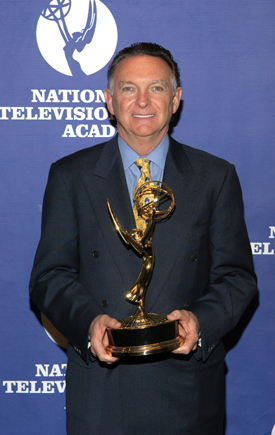 |
Shown at the 2005 Sports Emmy Awards, Trager is an Emmy winner and also has been active with the National Academy of Television Arts
& Sciences.
Photo by: GETTY IMAGES
|
In the early ’80s, he hung out a shingle as Sports Marketing and Television International, a property and TV rights agency that eventually became part of The Marquee Group and subsequently absorbed into the large SFX roll-up. Again, he spun out premier properties that are still vibrant, including the Breeders’ Cup, which united a thoroughly disparate thoroughbred racing community to produce its season-ending championship event.
SMTI ended up managing the Breeders’ Cup for 18 years.
The same year SMTI opened, a Supreme Court decision ended the NCAA’s control of college football television rights. Conferences scrambled to do their own deals through what was called the College Football Association, another early SMTI client. College football became another accelerant to cable TV’s growth, and Trager was there before most. He recalls those deals as some of his most political.
However, “Mike was always the coolest customer in the room, regardless of the stakes,” said Jim Gluckson, who ran communications at SMTI from 1986 until 2001. “He could always pull out a good deal, even with the toughest customers.”
The USFL was another early client, and like everyone involved in that league, Trager has crossed Donald Trump off his holiday card list for killing the league. Relationships continued to serve Trager well, too, as he convinced ESPN’s Simmons to be the league’s commissioner, negotiated its first TV deal and helped Herschel Walker become the first underclassman to leave college for a pro football contract.
“ABC offered $80 million for us to stay in the spring,” Trager said of the league, which played from 1983 until 1985. “I firmly believe had they not gone to fall they would still be around.”
Another agency first was getting college football televised on a weekday.
“[ESPN President] Steve Bornstein told me we couldn’t pull it off, but said if we did, he would put it on,” Trager said.
Once he was able to convince ESPN to pay the same for weeknight game as a weekend game, ESPN’s Thursday prime-time games were born in the 1980s.
As the gap between cable and broadcast TV rights fees lessened and college sports became meat and potatoes for cable, Trager and SMTI garnered more business.
Then, in 1993, Major League Baseball was in trouble. CBS suffered losses in the hundreds of millions on a four-year, $1.2 billion contract for exclusive MLB rights and would only come back at a huge discount. MLB decided to do its own network and formed The Baseball Network, a joint venture of MLB, ABC and NBC. The league would produce the telecasts of its games, which were then brokered to air on ABC and NBC.
There was no question to whom Schanzer, president and CEO of The Baseball Network, would turn. Trager added a Good Housekeeping seal.
He spent 75 percent of his time at TBN as executive vice president and continued as MLB’s out-of-house sponsorship expert for some years after the network was disbanded, pilloried by the strike that canceled the 1994 postseason. However, value eventually was restored to the league and Fox and NBC bought in.
Additionally, the litany of talent who worked at TBN is impressive by itself, including current NBC Sports Group President Jon Litner; MLB International head Paul Archey; YES Network’s Filippelli; Schanzer; Ed Delaney, Fox Sports executive vice president of operations; CW Network President Jed Petrick; and Dennis Swanson, executive vice president and COO of Viacom Television Stations.
Filippelli said that in their final presentation to ownership, TBN requested an $8 million investment to launch as a full-time network. “They weren’t ready for that after a strike,” he said.
The idea was ahead of its time. Today, of course, every league has its own network.

Trager was able to survive the Marquee-SFX roll-up — it was “too top heavy,” he says today — but not long after Clear Channel acquired SFX in 2000, Trager decided to again go out on his own.
Now chairman of The Trager Group, he takes on projects that still include college football as well as US Lacrosse and cheerleading giant Varsity Brands. He’s entering his second year as chairman of the LPGA board of directors, and it’s still a combination of style and acumen that compels sports business luminaries to seek his counsel.
 |
Shown during a World Series game in the 1970s, Trager’s two sons have followed him into the business. Today, Josh (left) is vice president of sales at Discovery Network, and Greg (right) is vice president of programming for CBS Sports Network.
|
“When I think of Mike, I think of casual Fridays,” said LPGA Commissioner Mike Whan. “When Mike comes in the room, the anxiety leaves, so everyone can focus. He has this quiet confidence that’s contagious.”
Trager continues as a confidant to many of the biggest names in TV sports, and sometimes to two sons, both of whom are in the business — Josh is vice president of sales at Discovery Network, while Greg is vice president of programming at CBS Sports Network.
When you ask colleagues what made Trager a success, they speak of his intellect, his ability to connect the dots across multiple fields, and always about his numerous long-standing relationships.
“Mike always told people what they needed to hear — not what they wanted to hear,” said Cliff Kaplan, who worked for Trager at The Baseball Network and The Marquee Group. “He built and maintained great relationships because of that.”
In sports, the biggest relationship business there is, Trager proved that Leo Durocher was mistaken. Apparently civility, loyalty, aplomb and endurance are the most enduring qualities.
“The feedback I got right away in the market when I started working for Mike made me feel that someday I wanted people in the business to hold me in the same regard,” said Michael Levine, co-head of CAA Sports, who chose to work for Trager at The Marquee Group instead of going to business school. “I wanted to win, but I wanted people to say I did it the right way.”




